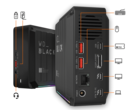A series of articles by Chris Mellor from the storage specialist website, Blocks and Files, has led to discussions about Western Digital (WD), Seagate, and Toshiba using shingled magnetic recording (SMR) across various consumer drives. Below is a summary of the issues.
What is Shingled Magnetic Recording (SMR)?
SMR is a technology that allows manufacturers to fit more data on to a drive platter by overlapping the sectors while still leaving a clear area for the read head to pass over. This results in a drive that can read at regular hard drive speed but is much slower during writing due to the way it needs to handle the overlapping data.
SMR drives can contain a write area utilising conventional hard drive storage patterns to act as a cache. SMR drives are often advertised as archival drives due to higher capacities at a slightly lower price, combined with slow writes and fast reads.
What is the new development here?
SMR drives are typically labelled as such and appear in product lines aimed at use cases where their deficiencies aren't a problem, e.g. the previously mentioned archival series.
Blocks and Files kickstarted an investigation into the use of SMR in non-SMR labelled drives after a reader contacted them regarding an issue they were having. Over several days they discovered that the three major manufacturers — Western Digital/WD, Seagate, and Toshiba — all have models within their regular drive line ups that utilise SMR even though they don't specifically advertise this.
Why is this an issue?
The issue is that these SMR drives sit within product lines where the poor write performance could impact on the systems in which they reside. Without specifying that these drives are SMR, users aren't able to avoid them if their use case is one that would be impacted.
Both Seagate and Toshiba utilise SMR across some of their consumer drives. The logic behind this is that most home workloads involve burst write loads that all fit within the cache area and are written to the slower SMR area during idle time. Toshiba gets off lightly here because unlabelled SMR is only used in some of their value drives, not NAS or performance models. Unfortunately, in Seagate's case, they started using SMR in Barracuda models which never previously used SMR technology.
Meanwhile, Western Digital is now using SMR in some recent revisions of their mid-sized Red NAS drives, which appears to have been causing issues when adding these drives to existing RAID pools made of non-SMR disks in some scenarios. The process of moving data from the cache zone onto the SMR zones appears to cause a timeout when adding an empty disk to the pool. This is the same unfortunate replacement scenario as Seagate, but with NAS drives rather than desktop drives.
Where can I find the full story?
Chris Mellor's articles over at Blocks and Files go into greater depth on each manufacturer, including their responses and which models are affected. We highly recommend checking out these articles:
I grew up in a family surrounded by technology, starting with my father loading up games for me on a Commodore 64, and later on a 486. In the late 90's and early 00's I started learning how to tinker with Windows, while also playing around with Linux distributions, both of which gave me an interest for learning how to make software do what you want it to do, and modifying settings that aren't normally user accessible. After this I started building my own computers, and tearing laptops apart, which gave me an insight into hardware and how it works in a complete system. Now keeping up with the latest in hardware and software news is a passion of mine.
> Expert Reviews and News on Laptops, Smartphones and Tech Innovations > News > News Archive > Newsarchive 2020 04 > Western Digital, Seagate, and Toshiba have been using slower technology in some recent hard drives without telling customers
Craig Ward, 2020-04-18 (Update: 2020-04-18)


 Deutsch
Deutsch English
English Español
Español Français
Français Italiano
Italiano Nederlands
Nederlands Polski
Polski Português
Português Русский
Русский Türkçe
Türkçe Svenska
Svenska Chinese
Chinese Magyar
Magyar




















